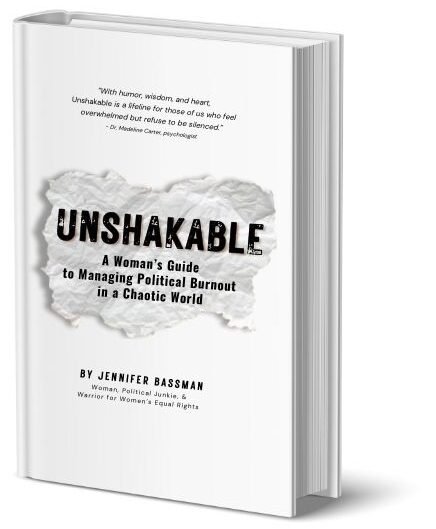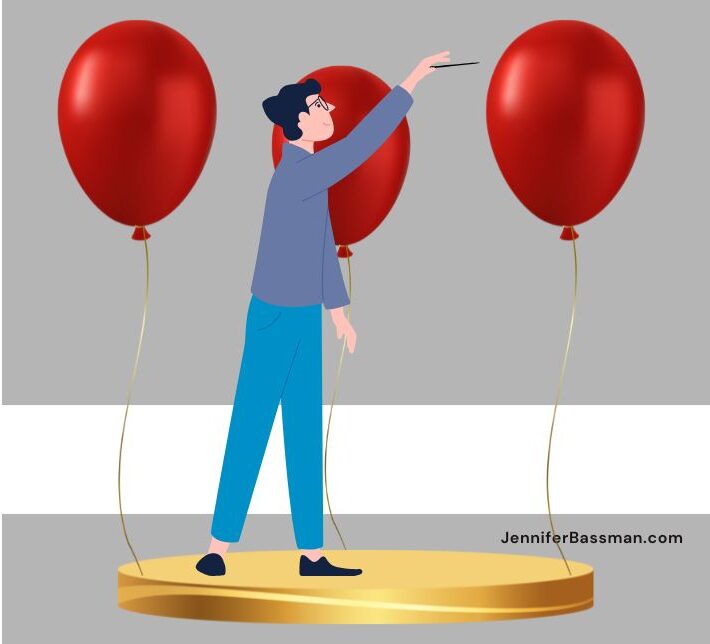I keep losing friends over politics.
It’s a story too many of us know all too well: you’re scrolling through social media, minding your own business, and suddenly you see it—your friend’s latest political rant.
It’s personal, pointed, and feels like a betrayal. How did you not know they felt this way? How could they say something so hurtful about people like you?
The next thing you know, you’ve unfollowed or even blocked them, and maybe after some reflection, you realize: this friendship is over.
Losing a friend over politics is emotionally exhausting, and in today’s political climate, it’s happening more often than we’d like to admit. The grief, frustration, and anger that follow can feel like losing a part of yourself, especially when this person was once a significant part of your life.
So, how do we cope when politics drives a wedge between us and those we care about?
Unshakable: A Woman’s Guide to Political Burnout in a Chaotic World (click here to buy on Amazon), a book I just published, helps us cope with friendship breakups due to politics.
What Happened to Me
I’d be lying if I said that I don’t love having political discussions. I’m even okay with disagreeing with others about our viewpoints. I just love to debate because I learn something every time.
Heck, I live in Texas – a state that has a slew of laws created by politicians I didn’t vote for, that directly affect and could kill me, that I disagree with. Even hate. And have very vocally spoken out and lobbied against them. (I can’t move somewhere else at the moment.)
So, I am surrounded by disagreement and discontent.
Yay.
It’s exhausting, honestly. More than once, I’ve thrown my hands in the air from feelings of overwhelm and defeat.
About eight years ago a line was crossed, where friendships became untenable, was when I saw a Facebook post from a friend that I have known for 20 years. Socialized with them frequently. I knew our politics differed, but it never affected our friendship. We’d always been able to have healthy discussions.
The post, in my friend’s own words, directly called for violence against anyone who didn’t agree with their political views.
Several of our mutual friends agreed with this person.
In that moment, I knew I would never feel safe around any of these people and unfriended all of them on social media and stopped socializing with them. I sent personal messages to people I cared about trying to salvage a relationship with, explaining my feelings and how their views could hurt or kill someone they said they considered a friend… me.
What Happened to the Friendships Ruined by Political Views
I was miserable and scared. It seemed surreal to me that the very people I thought had my back and would protect me, as I would protect them, wanted to see me harmed.
I questioned everything about myself. What did I miss? What had I done to contribute to them feeling this way? Am I wrong? Am I the problem?
At a certain point, I realized that I was also grieving because it felt like someone had died. I was mourning the loss of these friendships and connections. There were traditions and events that were still going on without me that made me feel I was missing out.
I had no idea how I was going to replace these friendships and connections, because having an active social life is important to me and my mental health.
Rebuilding a support system and friendships was overwhelming, but the only option. So, I went to work working on identifying people and opportunities.
Today, I do have a strong group of friends that I do trust. However, I will admit it’s not the same. Maybe that’s a good thing, though.
How to Get Through Political Differences Ending Friendships
In my book, Unshakable: A Woman’s Guide to Political Burnout in a World of Chaos, I explain how the loss of friendships contributes to the political burnout and stress that many of us are experiencing. I will help you connect all the dots to what feels like a lonely and isolating experience.
Losing a friend over politics is hard, but you can emerge stronger. Remember, it’s okay to grieve the loss and process the emotions, but it’s also okay to prioritize your mental health and move forward with the people who support your growth and well-being.
The following is a snippet from my book, Unshakable. I dive deeper into how to cope with political burnout, handle difficult conversations, and reclaim your peace of mind without sacrificing your values. This journey isn’t easy, but it’s one that can lead to healing, growth, and a renewed sense of power.
From Unshakable: A Woman’s Guide to Political Burnout in a World of Chaos:
- Acknowledge the Grief
Yes, it’s grief. Losing a friend—whether because of political differences or any other reason—hurts. When someone you once shared laughter and experiences with no longer feels safe or aligned with your values, it’s okay to grieve that loss. Give yourself permission to feel sad, angry, or confused.
Friendships often feel like family, and when one ends, it can be as painful as any breakup.
- Understand That Politics is Deeply Personal
Politics isn’t just about policies and debates—it’s about values, identity, and how we see the world. When someone’s political views clash with yours, it can feel like they are rejecting core aspects of who you are, especially if those views affect your rights or the rights of people you care about.
It’s essential to recognize that this isn’t just about opinions on taxes or healthcare. For many women, today’s political issues go to the heart of personal freedom, equality, and safety. It’s no wonder these differences can feel insurmountable.
- Reflect on the Role of Politics in Your Relationship
Were political differences always a part of your friendship? Did the recent climate intensify existing tensions?
Or was this a relationship where politics rarely came up, and now it feels like a dividing line?
Take a moment to reflect on whether this relationship is worth repairing or if the damage has been done. In some cases, friendships can survive political differences if there’s mutual respect and understanding. In others, especially if the differences feel like personal attacks, it may be time to let go.
- Give Yourself Time and Space
It’s okay to step back. Losing a friend, especially over something as sensitive as politics, takes time to process. You don’t have to immediately fill the void or force a resolution. Distance can give you clarity on how you truly feel about the situation and whether reconciliation is possible or even necessary.
- Practice Empathy, But Set Boundaries
Empathy is powerful, but it doesn’t mean you need to accept harmful behaviors or tolerate disrespect. Understanding someone else’s perspective can help soften the emotional blow, but it doesn’t mean you should compromise your values. Setting boundaries is crucial for your mental health, especially if someone’s views are hurtful or dehumanizing.
Boundaries might mean limiting political conversations with certain friends, taking a social media break, or deciding that some relationships aren’t worth the emotional toll.
- Rebuild Your Support System
One of the hardest parts about losing a friend over politics is the sense of isolation it can leave behind. You might feel like no one else understands, or that you’re losing people who’ve been by your side for years. But as painful as it is, it’s also an opportunity to rebuild your support system with people who align with your values and respect your boundaries.
Look for new connections that bring joy, positivity, and mutual respect into your life. Whether through shared hobbies, local groups, or even online communities, there are plenty of opportunities to find new friends who uplift and support you.
- Move Forward with Grace
Finally, moving forward doesn’t mean forgetting what happened or dismissing your feelings. It means choosing to heal. You don’t have to forgive or reconcile with everyone you’ve lost over politics, but you can choose not to carry the weight of that loss forever.






